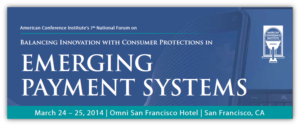 When: Monday, March 24 to Tuesday, March 25, 2014
Where: Omni San Francisco Hotel, San Francisco, CA
To learn more, visit: www.AmericanConference.com/emergingpayments
When: Monday, March 24 to Tuesday, March 25, 2014
Where: Omni San Francisco Hotel, San Francisco, CA
To learn more, visit: www.AmericanConference.com/emergingpayments
Industry News
Let private sector deal with fraud: Another view by Jason Oxman. Mr. Oxman will be presenting at ACI’s Emerging Payment Systems Forum this month.
Headline-grabbing events inevitably lead to calls for new laws. But in the case of our nation’s electronic payments systems, new government mandates would stifle marketplace innovations that hold great promise for providing consumer benefits and reducing criminal activities.
OUR VIEW: 3 ways to fight cybercrime
Financial institutions compete for customers by providing consumer protections even beyond requirements of current law. If a criminal steals a $20 bill from my wallet, it’s gone for good. But if I see a $20 fraudulent charge on my credit card statement, that criminal activity costs me nothing.
Many retailers also offer customers speedy transactions, such as “sign and go” and “swipe and go” for small transactions, while the payments industry ensures consumers still have zero liability. These protections and flexibility are why U.S. consumers are going cashless and carry more than one billion debit and credit cards. More than 70% of retail purchases are made with electronic payments, and our member companies process more than $4 trillion in electronic payments each year.
Fraud accounts for fewer than six cents of every $100 spent on payments systems — a fraction of a tenth of a percent. U.S. companies have made significant financial and technological investments, building sophisticated fraud tools that insulate consumers from liability. To build on this, Congress should foster greater international law enforcement cooperation to fight cybercrime, particularly in countries that harbor crime rings, and replace 46 divergent state breach notification laws with a uniform national standard.
The migration to cards that use chips instead of magnetic strips, known as EMV technology, is well underway in the U.S. No government regulation is needed to make it happen. But the EMV migration and the Target breach are different things. It’s true that EMV chip cards can prevent criminals from producing counterfeit cards using stolen account numbers. But EMV doesn’t stop criminals using stolen cards online. So innovators are deploying new technologies to deter other forms of fraud.
The private sector is best positioned to address the constantly shifting tactics of criminals, and it is doing so without government mandates. Do Americans really want the government in charge of the security and monitoring of our payments?
Jason Oxman is the CEO of the Electronic Transactions Association, which represents more than 500 payments and technology companies.